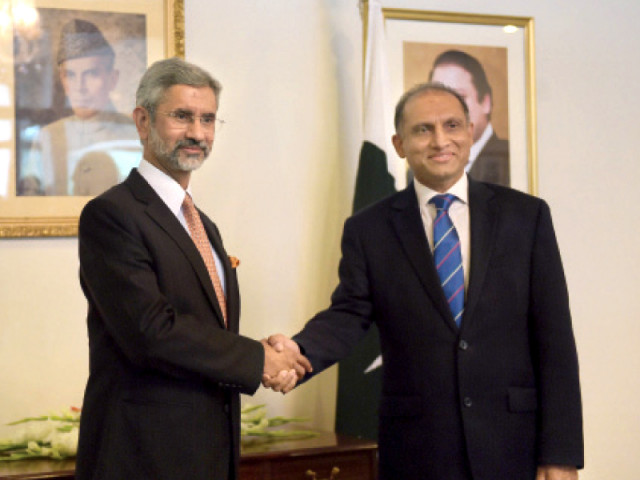
They may not have covered much ground on crunch issues bedevilling relations between their countries, Tuesday’s meeting between the foreign secretaries of Pakistan and India was at least the first senior-level diplomatic interaction between the two for nearly a year.
Indian Foreign Secretary Subrahmanyam Jaishankar, who was in Pakistan for the first high-level dialogue between the two hostile neighbours since their prime ministers met in New Delhi last May, met with his Pakistani counterpart Aizaz Ahmed Chaudhry.
They agreed to maintain ‘peace and tranquility’ along the Line of Control (LoC) and Working Boundary and called for finding common grounds to narrow down their differences. However, the meeting could not spring up any breakthrough on the main issue: resumption of composite dialogue process.
Relations between Pakistan and India, always fraught, soured further last August amid increased firing along the LoC and Working boundary and a row over a meeting of Pakistan’s high commissioner with Kashmiri leaders in New Delhi. Subsequently the ruling Bharatiya Janata Party pulled out of foreign secretary-level talks scheduled for August, last year. Pakistan’s foreign secretary told the media following the talks that the two sides would reflect on issues discussed in the meeting and then decide to take the next step.

Jaishankar was in Pakistan as part of his visit to the Saarc member states but the focus of his discussions in Islamabad remained on exploring possibilities for the resumption of talks.
While India raised concerns over ‘cross-border terrorism’ including slow progress on the trial of 2008 Mumbai siege suspects, Pakistan confronted the top Indian diplomat about his country’s alleged involvement in fomenting trouble in Balochistan and tribal regions.
Jaishankar read out a brief statement before the Pakistani media saying that talks were held in ‘constructive and positive’ manner. “We engaged in each other concerns and interests in an open manner. We agreed to work together to find common grounds and narrow the differences,” he said. “We agreed that ensuring peace and tranquility on the border is vital.”
He also reiterated India’s concerns on what he calls cross-border terrorism, including on the Mumbai attacks, which has been a perennial thorn in relations in recent years. New Delhi has been infuriated at Islamabad’s failure to prosecute effectively the alleged masterminds of the Mumbai carnage.
Separately, Foreign Secretary Chaudhry told reporters that Islamabad indeed raised the issue of India’s involvement in creating trouble in Balochistan and supporting militant outfits in the tribal areas.
“We also raised the issue of Samjhauta Express terrorist attack and Indian involvement in Fata and Balochistan,” he said in a rare move talking publicly about the controversy. “Menace of terrorism affects both countries and the whole region,” he stressed. Chaudhry said India had not yet shared any information regarding the investigations into the 2007 Samjhauta train tragedy in which several Pakistanis were killed.
Although Indian Foreign Secretary Jaishankar would not go into the specifics, his Pakistani counterpart said discussions covered all issues of mutual concern and common interest, including the Jammu and Kashmir dispute.
“I told my Indian counterpart that the leadership and people of Pakistan were deeply attached to the cause of Jammu & Kashmir and we need to make a concerted effort to resolve this dispute and indeed other disputes like Siachen, Sir Creek and water issues that could also be addressed through dialogue.”
On the ceasefire violations on the LoC and Working Boundary, Chaudhry said Pakistan conveyed its concerns over the issue and India equally agreed that ensuing peace and tranquility was vital. “It was pointed out by our side that we need to make the more optimal use of existing channels that are available to maintain the ceasefire,” he said.
When asked he refused to give a timeframe for the resumption of composite dialogue between the two countries. “It was decided that we both will reflect upon these issues and then determine how to proceed further,” he said.
Chaudhry endorsed his Indian counterpart’s view that both sides agreed to work together to narrow their differences.
The Indian foreign secretary also called on Prime Minister Nawaz Sharif. He delivered a letter to the prime minister on behalf of Indian Premier Narendra Modi. An official statement issued by the prime minister’s office said Nawaz Sharif said it was important to establish good neighbourly and cooperative relations between India and Pakistan.
He expressed confidence that Tuesday’s talks between the foreign secretaries of the two countries would result in charting the way forward in our bilateral relations.
The prime minister said both the countries need to start a new chapter in their relationship by working towards resolving their all outstanding issues through dialogue.
He said it was imperative that the leadership of the two countries rises up to the expectations of the two peoples. “We must think together, act together and move forward with the spirit of bringing the two nations closer to each other. The two countries should lend a hand of cooperation to each other to improve the standard of living of 1.5 billion people,” he added. Jaishankar said Prime Minister Modi was appreciative of the policies of the PML-N government and believed that they will bring a positive change in Pakistan.
Analysts said the visit would help warm ties.
“I think this will lower tensions and create (an) environment for the two countries to engage with each other on the issues of concern,” analyst Lt Gen (retd) Talat Masood told AFP. “Real progress can be achieved if the two countries try to cooperate with each other instead of undermining each other.”
Published in The Express Tribune, March 4th, 2015.


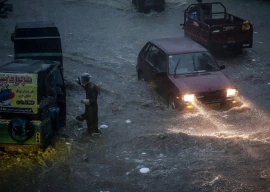

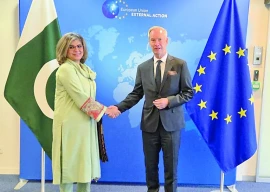




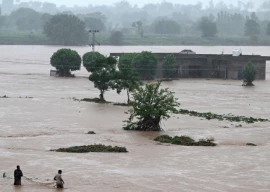
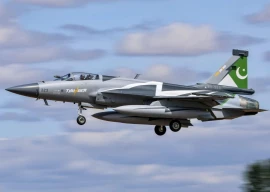
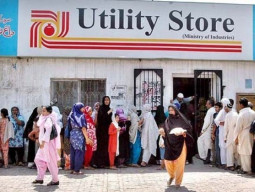






COMMENTS
Comments are moderated and generally will be posted if they are on-topic and not abusive.
For more information, please see our Comments FAQ